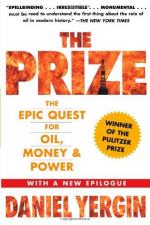|
This section contains 1,052 words (approx. 3 pages at 400 words per page) |

|
Part 4, Chapter 27 Summary
Overall, world energy consumption more than tripled in 1949-72, but oil demand increased by 5.5 times. U.S. demand went up three times, West European 15 times, Japanese 137 times. Rising standards of living translated into electrical appliances, central heating, and multi-car families. The factories that built these products were increasingly oil-fueled. Plastics proliferated. Cheap oil prices encouraged consumption. Tax revenues encouraged countries to press for greater volume, and profits encouraged companies to enter aggressively into whatever new markets they could find. New technology allowed refiners to get more high-value products from every barrel of crude oil. Coal was less convenient to use than oil, and the annual ritual of strikes by the United Mine Workers offered an incentive to covert to oil in the U.S. In Europe, the 1947 coal shortfall led governments to encourage conversion to oil as a stopgap. The Suez...
(read more from the Part 4, Chapter 27 Summary)
|
This section contains 1,052 words (approx. 3 pages at 400 words per page) |

|




